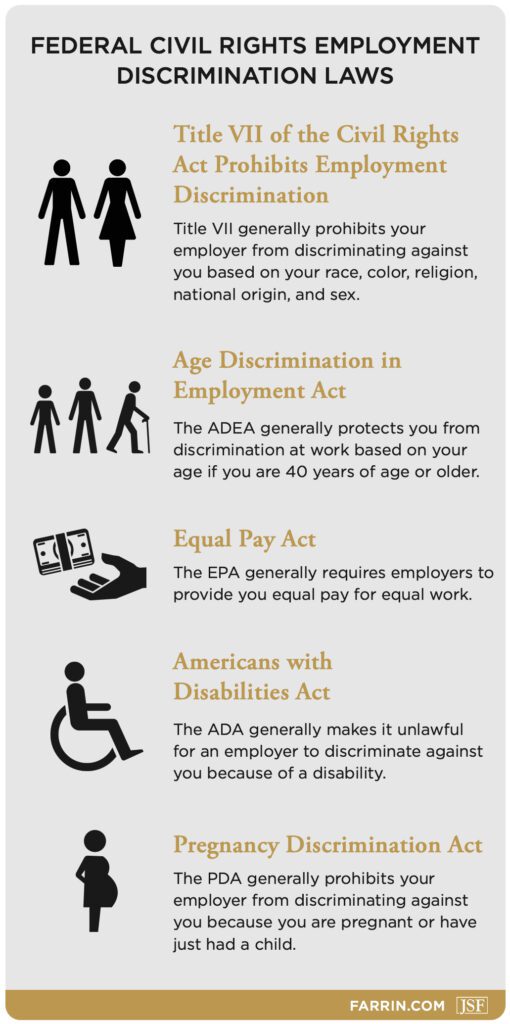Civil Rights Employment Discrimination Lawyers Protect People in North and South Carolina
People encounter discrimination in the workplace every day – sometimes it takes the form of obvious behavior and words, and other times it occurs through subtle employment practices. Either way, it can create an unhealthy and hostile work environment for employees in North and South Carolina.
If you are being discriminated against at your place of employment, there are laws and regulations a civil rights attorney can use to help you fight back.
A civil rights employment lawyer can help you with workplace discrimination by:
- Explaining your rights and how the law protects you
- Seeking proof of discriminatory behavior to try to build your case
- Reviewing your employment contract
- Advising you on legal action
- Keeping track of deadlines
- Filing an employment discrimination claim on your behalf if needed
- Representing you in a civil lawsuit against your employer if needed
At the Law Offices of James Scott Farrin, we know employment discrimination law and tackle tough workplace discrimination issues, such as retaliation, wrongful termination, and harassment on a regular basis. Our team has the knowledge and experience to listen carefully to your story, ask you questions about your work environment, investigate your claim, and help you determine your next steps.
Call us today at 1-866-900-7078 to discuss your employment discrimination case. We will give you a free professional opinion on your case with no obligation.
Title VII of the Civil Rights Act Prohibits Employment Discrimination
Title VII of the Civil Rights Act (Title VII) is a federal law that protects employees and job applicants from employment discrimination based on race, color, religion, national origin, and sex (including pregnancy, gender identification, and sexual orientation).
This anti-discrimination law covers a wide range of decisions and actions concerning the terms and conditions of employment, including:
- Recruitment
- Hiring
- Termination
- Job evaluation
- Promotion
- Training
- Compensation
- Disciplinary action
If you feel that your employer has shown prejudice or acted unfairly toward you in any of these behaviors, we can help you.
Have You Been Discriminated Against Because of Your Age?
Title VII does not cover discrimination based on age, but the Age Discrimination in Employment Act (ADEA) does. The ADEA is a federal law that protects qualifying employees and job applicants who are 40 years of age or older from discrimination on the basis of age.
The following are possible examples of behavior that may be discriminatory or could lead to discrimination:
- Does your manager frequently make age-related insults or call you “pops” or “old-timer” in front of others?
- Are all the new hires younger people and all the layoffs older workers?
- Are you frequently overlooked for assignments that you are fully qualified for which are then given to younger workers instead?
- Does your company have a mandatory retirement age?
- Has your manager said that the company needs a younger-looking person to do your job?
These are just a few of the unfair age-related situations that can occur at work. The ADEA covers all aspects of employment from hiring, assignments, and firing to training, pay, benefits, and more.
Have You Been Discriminated Against Because of Your Gender?
The Equal Pay Act (EPA) is an employment law that protects men and women from sex-based wage discrimination. It generally requires the payment of equal wages or benefits for people who perform substantially equal work in the same establishment.
Simply put, the EPA demands equal pay for equal work.
To succeed with your workplace discrimination claim, you must show that you and another employee of the opposite sex are:
- Working for the same employer
- Doing the same work
- Receiving unequal pay
In addition to wages, the EPA takes into account benefits such as health insurance coverage and retirement plans (as well as other types of compensation, such as vacation time and bonuses) when determining equal pay. A civil rights employment discrimination lawyer can help you consider all these important factors when building your case.
Have You Been Discriminated Against Because of Your Disability?
The Americans with Disabilities Act (ADA) prohibits employers from discriminating against qualified people with mental or physical disabilities in job application, hiring, firing, promotion, pay, and training decisions.
Examples of potential disability discrimination include:
- Asking for medical information or requiring an applicant to take a medical exam during the job application process
- Not providing reasonable accommodations to employees with disabilities to allow them to perform their duties
- Maintaining a workplace with physical barriers that inhibit movement for people with physical disabilities
If you have experienced disability discrimination, you are not alone. We can help you fight back.
Have You Been Discriminated Against Because of Your Pregnancy?
The news that an employee is expecting a child can sometimes prejudice an employer against that person. However, the Pregnancy Discrimination Act (PDA) amends Title VII to prohibit sex discrimination at work on the basis of pregnancy.
If your answer is “yes” to any of the following questions, your employer may be treating you unfairly and violating the PDA:
- Did your employer fire, demote, or force you to take leave after you announced your pregnancy?
- Did your employer refuse to give you the same or a similar job when you returned from leave?
- Were you provided reasonable accommodations for any pregnancy-related impairments?
- Did your employer force you to take a shorter leave than what other employees were allowed for medical or short-term disability leave?
- Did your employer fire or demote you after you requested time to pump after the birth of a child?
If you have answered “yes” to any of these questions, we urge you to discuss your case with a civil rights discrimination lawyer right away.
The North Carolina Equal Employment Practices Act
The North Carolina Equal Employment Practices Act (EEPA) and other state statutes generally make it illegal for an employer to discriminate on the basis of race, religion, color, national origin, age, sex, HIV/AIDS results for current employees, or disability.
This law aims to protect and safeguard the rights of North Carolinians to seek, obtain, and hold employment without facing discrimination. The NC EEPA is enforced through the Civil Rights Division of the North Carolina Office of Administrative Hearings.
The South Carolina Human Affairs Law
The South Carolina Human Affairs Law helps protect South Carolina residents from the following types of employment discrimination:
- Harassment based on race, color, religion, sex, national origin, age, or disability
- Denial of reasonable workplace accommodations for a disability or religious beliefs
- Retaliation because of workplace discrimination complaints
Your attorney can help you submit documentation to the South Carolina Human Affairs Commission about your employment discrimination situation and help you pursue justice under the SC Human Affairs Law, Title VII, the ADEA, or the ADA.
We Can Help You Fight Back Against Employment Discrimination
Our dedicated attorneys do not tolerate discrimination, and our firm has a long history of helping people fight against it. We led a team of attorneys in one of the largest civil rights cases in history, which led to a $1.25 billion settlement designed to give Black farmers compensation after years of discrimination by the USDA.1,3
We don’t want you to worry about whether you can afford an attorney’s help. That’s why we offer a free case evaluation and operate on a contingency fee basis. That means we won’t collect an attorney’s fee unless we recover for you. Guaranteed.2
If you need help, you can visit one of our many offices, or we can come to you anywhere across the Carolinas. For a free professional opinion on your case with no obligation, call 1-866-900-7078 today!





